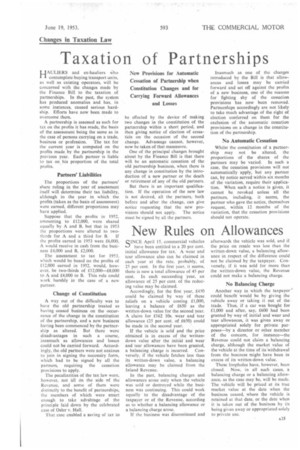Taxation of Partnerships
Page 53

If you've noticed an error in this article please click here to report it so we can fix it.
New Provisions for Automatic Cessation of Partnership when Constitution Changes and for Carrying Forward Allowances and Losses HAL:TIERS and ex-hauliers W•ho contemplate buying transport units, as well as existing operators, will be concerned with the changes made by the Finance Bill to the taxation of partnerships. In the past, the system has produced anomalies and has, in some instances, caused serious hardship. Efforts have now been made to overcome them.
A partnership is assessed as such for tax on the profits it has made, the basis of the assessment being the same as in the case of persons carrying on a trade, business or profession. The tax for the current year is computed on the profits made. by the partnership in the previous year. Each partner is liable to tax on his proportion of the total profits.
Partners Liabilities
The proportions of the partners' share ruling in the year of assessment itself will determine their tax liability, although in the year in which the profits (taken as the basis of assessment) were earned, different proportions may have applied.
Suppose that the profits in 1952, amounting to £12,000, were shared equally by A and B, but that in 1953 the proportions were altered to two thirds for A and a third for B. If the profits earned in 1953 were £6,000, A would receive in cash from the business £4,000 and B, £2,000.
The assessment to tax for 1953, which would be based on the profits of £12,000 earned in 1952, would, however, be two-thirds of 2,000—£8,000 to A and £4,000 to B. This rule could work harshly in the case of a new partner.
Change of Constitution
A way out of the difficulty was to have the old partnership treated as having ceased business on the occurrence of the change in the constitution of the partnership, and a new business having been commenced by the partnership as altered. But there were disadvantages in such a course, inasmuch as allowances and losses could not be carried forward. Accordingly, the old partners were not anxious to join in signing the necessary form, which had to be signed by all the partners, requiring the cessation provisions to apply.
The peculiarities of the tax law were, however, not all On the side of the Revenue, and some of them were distinctly to the benefit of partnerships, the members of which were smart enough to take advahtage of the principle laid down by the celebrated case of Osier v. Hall.
That case enabled a saving of tax to be effected by the device of making two changes in the constitution of the partnership within a short period, and then giving notice of election of eessatidn on the occasion of the second change. Advantage cannot, however, now he taken of that manoeuvre.
One of the principal changes brought about by the Finance Bill is that there will be an automatic cessation of the old partnership business, when there is any change in constitution by the introduction of a new partner or the death or retirement of any of the old partners.
But there is an important qualification. If the operation of the new law is not desired, all the partners, both before and after the change, can give notice requesting that the new provisions should not apply. The notice must he signed by all the partners. Inasmuch as one of the changes introduced by the Bill is that allowances and losses may be carried forward and set off against the profits of a new business, one of the reasons for fighting shy of the cessation provisions has now been removed. Partnerships accordingly are not likely to take much advantage of the right of election conferred on them for the exclusion •of the automatic cessation provisions on a change in the constitution of the partnership.
No Automatic Cessation
Whilst the constitution of a partnership may not be altered, the proportions of the shares of the partners may be varied. In such a case, the cessation provisions will not automatically apply, but any partner can, by notice served within six months of the variation, require their application. When such a notice is given, it cannot be revoked unless all the partners, including, it seems, the partner who gave the notice, themselves request, within 12 months of the variation, that the cessation provisions should not operate.




















































































